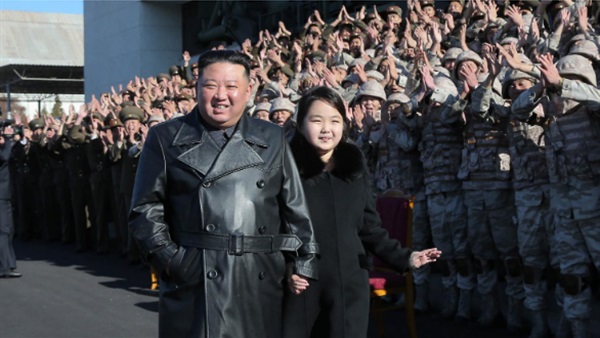Kim Jong-un ‘signalling that daughter Ju-ae will succeed him’

When Kim Jong-un walked hand in hand with his young daughter
to view the launch of a ballistic missile late last year, it seemed to many
people as clear a gesture as placing a crown upon her head.
Ju-ae, who is nine or ten, made two more public appearances
with her father in the weeks that followed. State media, which had never before
hinted at her existence, described her the dictator’s “most beloved child”.
North Korea is one of the world’s most repressive and opaque
states, and Pyongyang-watchers are used to reading between the lines of the
official coverage. This seemed a transparently symbolic action.
“[He] tried to link loyalty to himself with loyalty to his
daughter,” said Cheong Seong-chang a North Korea expert at Sejong Institute in
South Korea. “Kim intended to instill an image that his daughter would
succeed.”
However, two months on, a more complicated picture is
emerging of Kim’s abrupt and public display of paternal love. Rather than being
a straightforward announcement of a successor, some analysts think that it was
a complicated and subtle gesture aimed at defusing a growing rivalry between
the two other most important women in his life — his wife, Ri Sol-ju, and his
powerful and ambitious sister, Kim Yo-jong.
“As far as Ju-ae’s
appearance goes, the winner is Ri Sol-ju,” says Choi Jin-wook, president of the
Center for Strategic and Cultural Studies in Seoul. “The loser is Kim’s sister.
This is the most important message.”
In theory, as its official name suggests, leaders of the
Democratic People’s Republic of Korea are elected; in practice, it is the
world’s only hereditary communist dictatorship.
Kim succeeded his father, Kim Jong-il, who was the son of
the founding president, Kim Il-sung. But, as in many ruling dynasties,
succession is a fraught and complicated matter, without fixed rules and with
conventions that alter with each generation.
Laws of primogeniture do not apply. Jong-un, who has just
turned 40, was chosen by his father despite being the youngest of his three
sons, a situation that clearly made him feel exposed. In 2017 his older
half-brother, Jong-nam, who had lived abroad for years, and who had been mildly
critical of his brother, was killed with nerve agent in Malaysia. There is
little doubt that it was a state sponsored assassination authorised by the
supreme leader himself.
No woman has led the Kim dynasty, and in a conservative and
patriarchal society such as North Korea, some believe that it is unthinkable.
Confucian values privilege age over youth, as well as men over women – but Kim
Jong-un was not prevented by this from succeeding his dead father at the age of
just 27.
In the years since then, women have come unusually to the
fore. Kim’s father and grandfather had multiple wives and mistresses, but their
existence was never publicly discussed during their lifetimes. Early on,
though, Jong-un stepped out publicly with his young and, by Pyongyang
standards, fashionable, wife, Ri Sol-ju, 33.
The couple are believed to have three children, an older son
and two younger daughters – Ju-ae is either the second or the third child, and
the only one whose name is known. In the recent photographs, she can be seen to
have a resemblance to both her parents – her hair, and her expensive looking
clothes, resemble those of her mother.
But the most important and powerful of Kim’s women is his
younger sister, Kim Yo-jong, 35. She is one of his closest aides and often
serves as a spokeswoman on relations with South Korea. She is strikingly
direct, aggressive, and contemptuous in her utterances: in 2020 she described
anti-Kim activists in the South as “mongrel dogs” and “human scum little short
of wild animals”.
As a scion of the Kim dynasty and an experienced politician
(among other senior roles, she is the only woman on the State Affairs
Commission), no one else has more obvious qualifications to succeed her
brother, if he were to die – and such a circumstance can easily be imagined.
Although he is not old, Kim smokes, drinks and has long been
seriously overweight. He is reported to have gout and diabetes; both his father
and grandfather died of heart disease. If Kim were to keel over abruptly
without a clear successor, it would create a power vacuum, and no one would
have more to gain, or to lose, than his widow and sister, who would become
instant rivals.
North Korean politics is unforgiving and those who were once
close to power can find themselves suddenly victims. As well as his brother,
Kim Jong-un ordered the execution in 2013 of his uncle, Chang Sung-thaek,
formerly his closest adviser for, among other crimes, “failing to applaud
enthusiastically”.
Kim Yo-jong would want to move quickly to take power for
herself, and to exclude her dead brother’s family. Ri Sol-ju would do
everything to protect herself and her children. According to Dr Choi, this is
the likely reason behind the sudden publicity given to little miss Kim.
“Yo-jong is very powerful, ambitious and aggressive and
Kim’s wife is not happy about that, and that is why he publicly brought out
Ju-ae,” he says.
“You can’t rule out a female successor, although it’s more
likely to be his son in the end. But to bring the son out would have been too
obvious and painful for his sister. He has used the young one to send a subtle
message but a clear one – to reassure his wife and to tell his sister: this is
my daughter and she is the next generation.”





